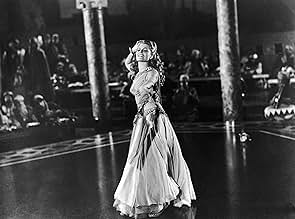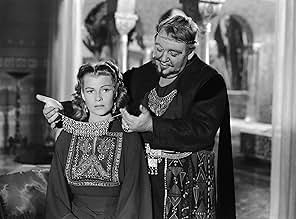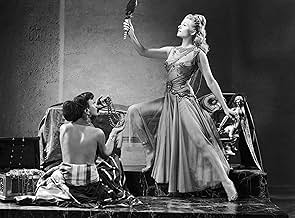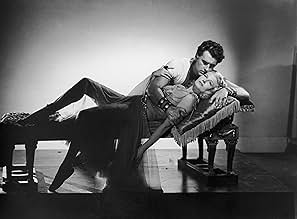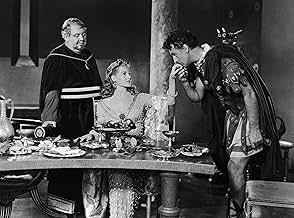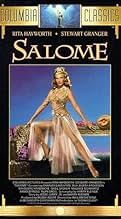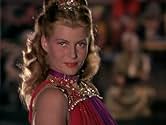CALIFICACIÓN DE IMDb
5.8/10
2.4 k
TU CALIFICACIÓN
Tras su destierro de Roma, la princesa judía Salomé regresa a su tierra natal, Galilea, gobernada por los romanos, donde el profeta Juan el Bautista predica contra los padres de Salomé, el r... Leer todoTras su destierro de Roma, la princesa judía Salomé regresa a su tierra natal, Galilea, gobernada por los romanos, donde el profeta Juan el Bautista predica contra los padres de Salomé, el rey Herodes y la reina Herodías.Tras su destierro de Roma, la princesa judía Salomé regresa a su tierra natal, Galilea, gobernada por los romanos, donde el profeta Juan el Bautista predica contra los padres de Salomé, el rey Herodes y la reina Herodías.
- Dirección
- Guionistas
- Elenco
- Premios
- 1 nominación en total
Cedric Hardwicke
- Tiberius Caesar
- (as Sir Cedric Hardwicke)
David Ahdar
- Convert
- (sin créditos)
Ray Beltram
- Herod's Council Member
- (sin créditos)
Bobker Ben Ali
- Politician
- (sin créditos)
Frederic Berest
- Sailor
- (sin créditos)
Barry Brooks
- Roman Guard
- (sin créditos)
Bruce Cameron
- Guard
- (sin créditos)
Eduardo Cansino
- Roman Guard
- (sin créditos)
Tristram Coffin
- Guard
- (sin créditos)
Bud Cokes
- Galilean Soldier
- (sin créditos)
Opiniones destacadas
I just finished watching this movie. I think it has been unfairly rundown by critics. Yes it is historically inaccurate, but how many Hollywood epics are actually accurate ? The answer is hardly any.
To me movies are essentially entertainment, and this movie really did that. Most of this was down to the casting of the stunningly beautiful Rita Hayworth in the title role. Her much mentioned "dance of the seven veils" is without a doubt the highlight of this film.
The performances by the rest of the cast are decent if not exceptional. Stewart Granger is the Roman commander who is secretly a Christian, Charles Laughton plays Herod, a man as much obsessed with pursuing Salome as with trying to spare John the Baptist for fear of what God will do to him in retaliation (he believes John the Baptist to be the Messiah).
It is definitely not one of the greatest epics and some of the dialogue is not the best, but the movie is certainly not the worst of Hollywoods many Biblical epics. It is far more entertaining than "The Robe" and Rita Hayworth's radiance is extremely easy on the eye.
To me movies are essentially entertainment, and this movie really did that. Most of this was down to the casting of the stunningly beautiful Rita Hayworth in the title role. Her much mentioned "dance of the seven veils" is without a doubt the highlight of this film.
The performances by the rest of the cast are decent if not exceptional. Stewart Granger is the Roman commander who is secretly a Christian, Charles Laughton plays Herod, a man as much obsessed with pursuing Salome as with trying to spare John the Baptist for fear of what God will do to him in retaliation (he believes John the Baptist to be the Messiah).
It is definitely not one of the greatest epics and some of the dialogue is not the best, but the movie is certainly not the worst of Hollywoods many Biblical epics. It is far more entertaining than "The Robe" and Rita Hayworth's radiance is extremely easy on the eye.
Banished from Rome by Emperor Tiberius Augustus : Cedric Hardwicke , Salome : Rita Hayworth abandoning her boyfriend : Rex Reason , returns to Jerusalem , there being infatuated by both , a good-looking Roman Centurion : Stewart Granger , and the licentious Herodes : Charles Laughton who is lasciviously after her , while John the Baptist : Alan Badel loses his head .
Spectacular and colorful film , with plenty of some viviv large-scales scenes , certainly , but lacks fidelity to Holy Bible , this is very free and loose rendition based on Ancient Scriptures . Here outstanding Rita Hayworth and her famous dance , as she sinuously shedding her Seven Veils . The best perfomances go to Alan Badel as a fanatic John the Baptist along with Charles Laughton as a lascivious Herodes Antipas and well supported by the usually baddie Judith Anderson as his Queen , Herodias . Including other illustruous secondaries as Sir Cedric Hardwick as emperor Tiberius , Arnold Moss , Maurice Schwarz , Rex Reason, and Basil Sydney as Pontius Pilatos .
It contains a moving and stirring musical score by George Duning , adding some religious and oriental sounds . As well as evocative cinematography in Technicolor by cameraman Charles Lang , though a perfect remastering being really necessary . The picture benefits itself to be shot in location in Israel, though wasted because of no too much exteriors . This Biblic rendition far from faithful to its origin , and according to Columbia Pictures and it was professionally directed by William Dieterle , though it has a few gaps and failures . Dieterle was a good director, making nice films and some masterpieces , as he directed the following ones : "Devil and Daniel Webster" , "Hunchback of Notre Dame" , "Juarez" , "Life of Emile Zola" , "Quick Let's get married" , and his greatest success : "Portrait of Jennie" , among others. Rating : 6/10, acceptable , but neither extraordinary , not notable , but passable . The yarn will appeal to Rita Hayworth , Stewart Granger and Charles Laughton fans .
Spectacular and colorful film , with plenty of some viviv large-scales scenes , certainly , but lacks fidelity to Holy Bible , this is very free and loose rendition based on Ancient Scriptures . Here outstanding Rita Hayworth and her famous dance , as she sinuously shedding her Seven Veils . The best perfomances go to Alan Badel as a fanatic John the Baptist along with Charles Laughton as a lascivious Herodes Antipas and well supported by the usually baddie Judith Anderson as his Queen , Herodias . Including other illustruous secondaries as Sir Cedric Hardwick as emperor Tiberius , Arnold Moss , Maurice Schwarz , Rex Reason, and Basil Sydney as Pontius Pilatos .
It contains a moving and stirring musical score by George Duning , adding some religious and oriental sounds . As well as evocative cinematography in Technicolor by cameraman Charles Lang , though a perfect remastering being really necessary . The picture benefits itself to be shot in location in Israel, though wasted because of no too much exteriors . This Biblic rendition far from faithful to its origin , and according to Columbia Pictures and it was professionally directed by William Dieterle , though it has a few gaps and failures . Dieterle was a good director, making nice films and some masterpieces , as he directed the following ones : "Devil and Daniel Webster" , "Hunchback of Notre Dame" , "Juarez" , "Life of Emile Zola" , "Quick Let's get married" , and his greatest success : "Portrait of Jennie" , among others. Rating : 6/10, acceptable , but neither extraordinary , not notable , but passable . The yarn will appeal to Rita Hayworth , Stewart Granger and Charles Laughton fans .
The reason why you 'd like to sit through this is the four leads:Rita Hayworth ,ideally cast as Salome ,a libidinous Charles Laughton ,a cruel Judith Anderson and a noble Stewart Granger.Plus a stint by Sir Cedric Hardwicke.Plus the director of the best version of "hunchback of Notre -Dame" at his kitchiest.Plus a fabulous dance of the seven veils.Plus gaudy colors and John the Baptist's head of course.
But what remains,eg the essential ,is a really "free' adaptation of the holy writs.The script writers invented a Roman soldier with whom Salome falls in love.BUT what will puzzle the Christians is that Salome dances not to get John's head,but to save him!!!.A happy end which will remind you of your Sunday school days.And that's not all:the plot even involves Pontius Pilate whom Claudius (Granger) urged to become a Christian and to repent so that he would go down in history as a soldier of a brand new religion.Well the man did not wash his hands ,but he did not do what he was told either...which did not prevent him from going down in history anyway..
But what remains,eg the essential ,is a really "free' adaptation of the holy writs.The script writers invented a Roman soldier with whom Salome falls in love.BUT what will puzzle the Christians is that Salome dances not to get John's head,but to save him!!!.A happy end which will remind you of your Sunday school days.And that's not all:the plot even involves Pontius Pilate whom Claudius (Granger) urged to become a Christian and to repent so that he would go down in history as a soldier of a brand new religion.Well the man did not wash his hands ,but he did not do what he was told either...which did not prevent him from going down in history anyway..
Epic films based upon the Bible were popular in the 1950s, but sometimes they were only very loosely so based. "Salome" is a case in point. The "damsel" whose seductive dance before King Herod led to the execution of John the Baptist is not actually named in the New Testament, but tradition has identified her with Princess Salome, the daughter of Queen Herodias and the niece and stepdaughter of Herod. She has traditionally been painted as the ultimate Bad Girl, a wanton teenage temptress whose thoughtless cruelty led to John's death.
Well, in this film Salome is no longer a teenager but a mature beauty in her mid-thirties. (Rita Hayworth would have been 35 in 1953). More importantly, she is no longer a Bad Girl. (The studio, apparently, did not want Rita to play a villainess). To begin with, she is proud and independent-minded, but gradually softens under the influence of John's teaching and eventually converts to Christianity. (A "Salome" is numbered among Christ's followers in Mark's Gospel, but this is generally believed to have been a different person). Yes, she still gets to perform her sexy "Dance of the Seven Veils", but her motives for doing so are the precise opposite of those attributed to her in the Scriptures. In this version she is dancing in the hope that she can thereby influence the King to spare John's life.
As the film opens, Salome is living in Rome, where she has lived for most of her life. She has fallen in love with Marcellus, nephew of the Emperor Tiberius, but he forbids their marriage, not wanting a member of his family to marry a "barbarian", and exiles her back to Galilee. Once there she finds herself in a complicated political situation, made more complex by the teachings of the Baptist who condemns Herod's rule and his adulterous marriage to his brother's wife. Herodias is furious, and demands that her husband condemn the Baptist to death for treason, but he is reluctant to do so, believing that he will be cursed if he does; his reluctance makes their already unhappy marriage even more strained. In the meantime, Salome has found a new boyfriend, the handsome Roman soldier Claudius, who shares her interest in John's teaching.
Some later Biblical epics were an odd mixture of godliness and sexiness, combining an improving Christian moral with plenty of bare flesh on display. An example is "Esther and the King" in which Queen Vashti (who in the Bible is banished for refusing her husband's command to "show the people and the princes her beauty") gets into hot water for quite the opposite offence, that of showing them more of her beauty than she should by stripping down to her panties in the Royal Palace. In 1953, however, the Production Code was more rigidly enforced, so "Salome" is, on the surface at least, more godly than sexy. Hayworth's dance is really a Dance of the Six Veils, as she never removes the seventh and therefore remains fairly modestly clad to the end.
Below that surface, however, there is a lot going on. Hayworth, as lovely in her thirties as she had been a decade earlier, was gifted enough, both as an actress and as a dancer, to convey a great deal of erotic allure even when fully clothed, and although the censors could come down hard on any explicit displays of nudity, this sort of subtle sexuality was much more difficult for them to control. "Salome" is far from being Rita's greatest film (that was probably "Gilda"), but that dance is one of her greatest moments. (She later claimed it was "the most demanding of her entire career" as the director William Dieterle demanded endless retakes).
Among the other actors, the best contribution comes from Charles Laughton as the slimily lecherous Herod. Laughton had a tendency to overact, but in a role like this overacting is not necessarily a bad thing. Easily the worst comes from Alan Badel, playing John the Baptist not so much as a prophet as a swivel-eyed religious maniac, the first- century Galilean equivalent of a Hyde Park soapbox preacher. Judith Anderson is good as Herodias, but Stewart Granger is a bit wooden as Claudius, possibly because his character does not have much to do except stand around to provide a love-interest for the leading lady.
"Salome" will never, in my opinion at least, rank alongside the grand epics like "Ben-Hur" or "Spartacus"; there is too much of the smell of cheesy Hollywood sanctimoniousness about it. It does, however, have its virtues, and is certainly better than the likes of "Esther and the King", "The Silver Chalice" or "Sodom and Gomorrah", all of which do not just smell of sanctimoniousness but positively reek of it. It makes enjoyable, if undemanding, watching on a Sunday afternoon. 6/10
Some goofs. Claudius and Pontius Pilate refer to their military service in Britain, but Britain was not a Roman province during the reign of Tiberius. And whatever persuaded the scriptwriter that Gila monsters (natives of Mexico and the American South-West) are to be found in Israel?
Well, in this film Salome is no longer a teenager but a mature beauty in her mid-thirties. (Rita Hayworth would have been 35 in 1953). More importantly, she is no longer a Bad Girl. (The studio, apparently, did not want Rita to play a villainess). To begin with, she is proud and independent-minded, but gradually softens under the influence of John's teaching and eventually converts to Christianity. (A "Salome" is numbered among Christ's followers in Mark's Gospel, but this is generally believed to have been a different person). Yes, she still gets to perform her sexy "Dance of the Seven Veils", but her motives for doing so are the precise opposite of those attributed to her in the Scriptures. In this version she is dancing in the hope that she can thereby influence the King to spare John's life.
As the film opens, Salome is living in Rome, where she has lived for most of her life. She has fallen in love with Marcellus, nephew of the Emperor Tiberius, but he forbids their marriage, not wanting a member of his family to marry a "barbarian", and exiles her back to Galilee. Once there she finds herself in a complicated political situation, made more complex by the teachings of the Baptist who condemns Herod's rule and his adulterous marriage to his brother's wife. Herodias is furious, and demands that her husband condemn the Baptist to death for treason, but he is reluctant to do so, believing that he will be cursed if he does; his reluctance makes their already unhappy marriage even more strained. In the meantime, Salome has found a new boyfriend, the handsome Roman soldier Claudius, who shares her interest in John's teaching.
Some later Biblical epics were an odd mixture of godliness and sexiness, combining an improving Christian moral with plenty of bare flesh on display. An example is "Esther and the King" in which Queen Vashti (who in the Bible is banished for refusing her husband's command to "show the people and the princes her beauty") gets into hot water for quite the opposite offence, that of showing them more of her beauty than she should by stripping down to her panties in the Royal Palace. In 1953, however, the Production Code was more rigidly enforced, so "Salome" is, on the surface at least, more godly than sexy. Hayworth's dance is really a Dance of the Six Veils, as she never removes the seventh and therefore remains fairly modestly clad to the end.
Below that surface, however, there is a lot going on. Hayworth, as lovely in her thirties as she had been a decade earlier, was gifted enough, both as an actress and as a dancer, to convey a great deal of erotic allure even when fully clothed, and although the censors could come down hard on any explicit displays of nudity, this sort of subtle sexuality was much more difficult for them to control. "Salome" is far from being Rita's greatest film (that was probably "Gilda"), but that dance is one of her greatest moments. (She later claimed it was "the most demanding of her entire career" as the director William Dieterle demanded endless retakes).
Among the other actors, the best contribution comes from Charles Laughton as the slimily lecherous Herod. Laughton had a tendency to overact, but in a role like this overacting is not necessarily a bad thing. Easily the worst comes from Alan Badel, playing John the Baptist not so much as a prophet as a swivel-eyed religious maniac, the first- century Galilean equivalent of a Hyde Park soapbox preacher. Judith Anderson is good as Herodias, but Stewart Granger is a bit wooden as Claudius, possibly because his character does not have much to do except stand around to provide a love-interest for the leading lady.
"Salome" will never, in my opinion at least, rank alongside the grand epics like "Ben-Hur" or "Spartacus"; there is too much of the smell of cheesy Hollywood sanctimoniousness about it. It does, however, have its virtues, and is certainly better than the likes of "Esther and the King", "The Silver Chalice" or "Sodom and Gomorrah", all of which do not just smell of sanctimoniousness but positively reek of it. It makes enjoyable, if undemanding, watching on a Sunday afternoon. 6/10
Some goofs. Claudius and Pontius Pilate refer to their military service in Britain, but Britain was not a Roman province during the reign of Tiberius. And whatever persuaded the scriptwriter that Gila monsters (natives of Mexico and the American South-West) are to be found in Israel?
Don't bother watching this film for historical accuracy. Watch it instead for entertainment value only and to see why Rita Hayworth was worshipped as a Goddess.
You can almost feel the debauchery oozing out of Charles Laughton's Herod as he oils his way through the film. And Judith Anderson's Queen Herodias is completely over the top, but you can see where she's coming from and that she's a product of her circumstances. Stewart Granger is almost out of place here as he's the only one not seriously hamming it up, but he still does a relatively convincing job as Commander Claudius, improving as the film progresses.
I love this film for the wonderful elocution-lesson delivery of the dialogue and the gloriously artificial colouring which give a lovely fantasy recreation of biblical times: even though bad things happen, they just don't seem that bad. And even after all these years Rita Hayworth's dancing is a vision to behold for men and women alike.
You can almost feel the debauchery oozing out of Charles Laughton's Herod as he oils his way through the film. And Judith Anderson's Queen Herodias is completely over the top, but you can see where she's coming from and that she's a product of her circumstances. Stewart Granger is almost out of place here as he's the only one not seriously hamming it up, but he still does a relatively convincing job as Commander Claudius, improving as the film progresses.
I love this film for the wonderful elocution-lesson delivery of the dialogue and the gloriously artificial colouring which give a lovely fantasy recreation of biblical times: even though bad things happen, they just don't seem that bad. And even after all these years Rita Hayworth's dancing is a vision to behold for men and women alike.
¿Sabías que…?
- TriviaThis was the last movie produced by Rita Hayworth's production company, the Beckworth Company. Hayworth later called her "Dance of the Seven Veils" in this movie, "the most demanding of my entire career", and said it required "endless takes and retakes."
- ErroresIn Palestine, Claudius saves Salome from a gila monster, a venomous lizard found only in southwestern North America.
- Citas
Queen Herodias: The desperate can only survive by taking desperate measures.
- Créditos curiososAt the end of the picture, rather than seeing the words The End on the screen, we see a title that says This was The Beginning.
- ConexionesEdited into Hércules y los tres chiflados (1962)
Selecciones populares
Inicia sesión para calificar y agrega a la lista de videos para obtener recomendaciones personalizadas
- How long is Salome?Con tecnología de Alexa
Detalles
- Tiempo de ejecución
- 1h 43min(103 min)
- Relación de aspecto
- 1.37 : 1
Contribuir a esta página
Sugiere una edición o agrega el contenido que falta


